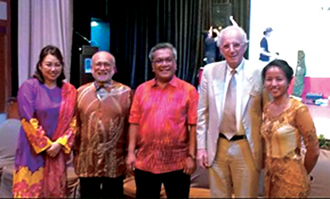3 Sabah NGOs shine at Asean Smart Village Workshop
Published on: Friday, February 06, 2015

Kuching: Three Sabah non-governmental organisations (NGOs) were featured at the recent high-profile Asean Smart Village Workshop held at Universiti Malaysia Sarawak (Unimas), here.The Sabah Women Entrepreneurs & Professionals Association (Swepa), Lightup Borneo and Tonibung were clearly fired up for further action to let the lights shine in rural Sabah after attending the workshop. Their representatives captured the audience's attention by sharing their experiences on the ground, directly interacting with the local communities.
ADVERTISEMENT
Swepa was represented by Immediate Past President, Hanaa Wong Abdullah and Project Manager Yap Li Ling, who gave a slide presentation on the Swepa Barefoot Solar Project in Kota Marudu in the northern part of Sabah. Hanaa reported that an illiterate grandmother from the district will return to Sabah in March 2015 after a six-month training stint in India to be the first "Barefoot Woman Solar Engineer" in Malaysia to light up 100 homes in her village, Kg. Sonsogon Magandai.Yeo Eng Khean from Lightup Borneo highlighted their floating hydro project in Long Pasia, the Swan 2, with a video presentation while Adrian Lasimbang of Tonibung spoke on micro-hydro development in Sabah.Currently, Tonibung has full capacity to fabricate and assemble micro-hydro turbines at their Centre for Renewable Energy and Appropriate Technologies (Create) in Penampang.
ADVERTISEMENT
"Whilst it was inspiring to hear about all the good work being done in the region of giving rural communities access to electricity and light whether by hydro, solar or hybrid systems, it was also worrisome to understand that many projects are still done in silos by different organisations, government agencies and universities in the same areas," Hanaa pointed out.She noted that one critical issue raised at the Smart Villages Workshop is how all stakeholders might integrate projects to lower the cost of implementation and to achieve the aim of more effective initiatives at national, regional and global levels.
ADVERTISEMENT
Hanaa stressed that this is essential to progress towards attaining village energy for development, and to support achievement of the UN's goal of sustainable energy for all by 2030. According to her, one response to this was that universities' representatives present at the workshop encouraged and would welcome all NGOs to approach them to work on projects together or to access any relevant research done in the areas where suitable rural communities are identified for electrification. "The organisers and participants are looking forward to post-Kuching events where all can gather again to continue discussions and to engage further with each other for more action to be taken for positive outcomes," she enthused. For more information on the Smart Villages initiative, visit their website www.e4sv.org. Meanwhile, Unimas shared the success story of their e-Bario project, an ICT research-based initiative with a people-centred/participatory approach, aimed to deploy ICT, empower and train the Bario community to apply ICT in improving their livelihood. More recently, their Long Lamai project showed how entrepreneurship can be cultivated for a village after the introduction of renewable energy, especially in the areas of e-commerce and ecotourism. From the Malaysia experience, Tenaga Nasional Berhad shared about the Rimbunan Kaseh Smart Village Project in Pahang, built to serve as an example of how to address rural poverty issues by promoting environmental sustainability with technology. Overall, participants at the workshop agreed that more work is needed since more than 1.2 billion people in the world have no access to electricity, according to the World Bank Group (www.worldbank.org).Hanaa, who is also Deputy Organising Chairperson of Swepa Barefoot Solar Project, said the three-day Smart Village Workshop brought together local NGOs, energy champions from Africa, India, Philippines, Thailand, Cambodia, Myanmar, Singapore and Malaysia, academicians from these countries as well as from the University of Ottawa (Canada), Uppsala Universitet (Sweden) and the Universities of Oxford and Cambridge, to generate insights into how to tackle the challenges of village energy access for development. Minister for Science, Technology and Innovation, Datuk Dr Ewon Ebin officiated at the launch of the workshop at Unimas."The Smart Villages Initiative (e4sv.org) aims to provide policy makers, donors and development agencies concerned with rural energy access with new insights on the real barriers to energy access in villages in developing countries – technological, financial, social and political – and how they can be overcome," said Hanaa.She said the focus is on remote off-grid villages, where local solutions (home- or institution-based systems, and mini-grids) are both more realistic and cheaper than national grid extension.The Smart Villages team, based at the Universities of Cambridge and Oxford in the UK, has been established by the Cambridge Malaysian Education and Development Trust (CMEDT). Key partners in the project are the national science academies and their networks. Funding is being provided by CMEDT and the Templeton World Charity Foundation.Among the key speakers at a plenary session were Ir G. Lalchand FASc, a Fellow at Akademi Sains Malaysia and Professor Sir Brian Heap who is Immediate Past President of the European Academies Science Advisory Council (EASAC).Stay up-to-date by following Daily Express’s Telegram channel.
Daily Express Malaysia




